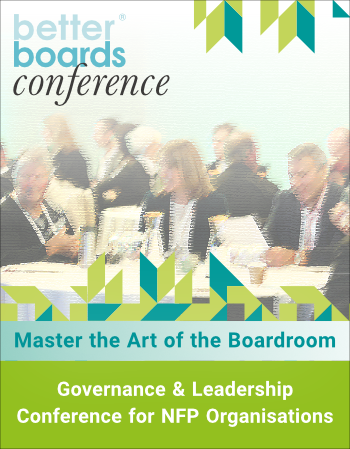legal
Passion and Professionalism: Legal Duties of a Volunteer Board
Published: June 8, 2015
Read Time: 5 minutes

Identify what you’re missing… and then work out how to get it!
Effective not-for-profit boards possess a winning combination of passion and professionalism. It is crucial that all board members understand the personal legal responsibilities they assume when they become a director of a board. Regardless of their connection to the cause, a person should not accept a directorship or remain as director without the appropriate skills and competence to perform their role.
Boards can assist their directors in meeting their legal obligations by having clear policies, conducting regular training and reviews of their board, and identifying any gaps in knowledge and skills. This process is usually led by the secretary and the chair of the board.
All directors should be familiar with the basic director’s duties, some of which we will discuss in greater detail below. These duties apply to each director, while office holders such as secretary and treasurer attract additional duties.
Duty of Care, Skill and Diligence
Directors have a legal duty to apply a standard of care and diligence that is expected to be applied by a reasonable person in the circumstances. This duty applies regardless of whether a person is a volunteer, new to the board, or temporarily filling the position.
Each director must ensure that they understand the affairs of the organisation, particularly in relation to its financial management and its capacity to meet contractual obligations. This duty can be particularly challenging for directors who lack financial literacy. Similarly, those directors on health or aged care services boards with little if any clinical knowledge must be aware of their obligations in relation to clinical governance.
Duty of Good Faith
Directors are obliged to act honestly and not recklessly in discharging their duties. Misappropriation of the organisation’s assets, a misuse of power or a failure to avoid a conflict of interest can result in a court finding that a director has contravened the law. This can result in large fines, an order to pay compensation and in some instances time served in jail.
Conflicts of Interest
Board members have a fiduciary obligation to act in the best interests of the organisation that they serve. A conflict of interest arises where a director’s duties clash with their personal interests. Volunteer board members often have social, family or business relationships related to the organisation’s cause and therefore some conflicts of interest should be considered inevitable. In smaller and community based organisations with volunteer boards, it can be more difficult to manage conflicts of interests due to the often interconnected personal ties between the volunteer directors and the organisation.
The following are examples of potential conflicts:
- Awarding a contract to an organisation that employs them;
- Employing a family member;
- The sale of corporate assets to a friend; and
- Making use of information acquired through the board in the course of their employment or business.
It is important that boards take a strong stance in recognising any conflicts of interest and react accordingly. The board should adopt policies and procedures that include methods used to identify conflicts and procedures to be followed when a conflict arises.
The organisation’s policies and procedures should address:
- How and when board members should disclose their personal interests (for example, a standard agenda item inviting members to disclose);
- Under what circumstances relatives, friends, or employers of directors can be hired or considered for contracts;
- How gifts and offers of gifts should be dealt with; and
- Efforts to ensure diversity on the board.
Where a board is concerned that there may be a risk of a real or perceived conflict of interest, legal advice should be sought to assess the situation and provide advice on how to avoid the conflict. A board may also decide to obtain legal advice in relation to the drafting of their policies and procedures.
Gaps in Knowledge and Skills
It is important for boards to identify what they do not know and also how to fill these gaps in their knowledge. We recommend that all boards have a skills matrix identifying the skills they need and recruit in accordance with those needs. If your board has identified a knowledge gap, make sure to take appropriate steps to address it.
Has your board considered any of the following?
- Including a standing annual agenda item requiring the board to identify any skills that their board is lacking.
- Actively seeking diversity; in age, gender, background, ethnicity, skills, experience.
- Co-opting skilled directors where your rules allow it.
- Advertising for a director with specific skill set.
- Actively targeting an individual with a specific skill set and inviting them to join your board or be co-opted onto a specialist sub committee.
- Allocating an annual budget for training of the board.
- Applying for scholarships in governance training for the board.
- Creating a proposal about your organisation and approaching a commercial organisation (for example, an accounting firm) that possesses the skills set you require, and asking for a volunteer director.
- Inviting a governance expert to present to your board
- Investing in written and online materials regarding governance.
Alternative Roles for Would Be Volunteer Directors
Directorships are not for everyone – but don’t discard the ideas and input of enthusiastic volunteers!
A person who is unable or unwilling to meet the legal standards and demands placed on directors is by no means unable to contribute to an organisation. Boards wishing to utilise the thoughts and opinions of community members, stakeholders and consumers should examine other ways to allow non-directors to inform the direction of a not-for-profit organisation.
Consider adopting a structure successfully used by many not-for-profit organisations; create stakeholder or community ‘think tanks’ or working groups which report to the board and provide their own assessment of how the organisation is being run.
In Summary
There are significant personal consequences for directors who fail to properly discharge their legal obligations. Ignorance and good intentions are insufficient excuses for directors who are found to be in breach. Each director has a personal obligation to understand the legal duties they assume when joining a board.
This article was originally published in the Better Boards Conference 2014 Conference Magazine.
Share this Article
Recommended Reading
Recommended Viewing
Author
-
Partner
HWL Ebsworth Lawyers
- About
-
Sabine represents health, aged and disability care clients in areas such as risk management, inquiries and investigations, dispute resolution, coronial inquests and policy review and development. She also undertakes corporate and clinical governance reviews and facilitation of board planning. She is a board member of Uniting AgeWell, a FAICD, a Fellow of the College of Nursing, and an Associate Fellow of the College of Health Service Executives. Sabine was nominated by peers as “Best Lawyer” in the 2017 Awards in the category of Retirement Villages and Senior Living Law.
Found this article useful or informative?
Join 5,000+ not-for-profit & for-purpose directors receiving the latest insights on governance and leadership.
Receive a free e-book on improving your board decisions when you subscribe.
Unsubscribe anytime. We care about your privacy - read our Privacy Policy .







